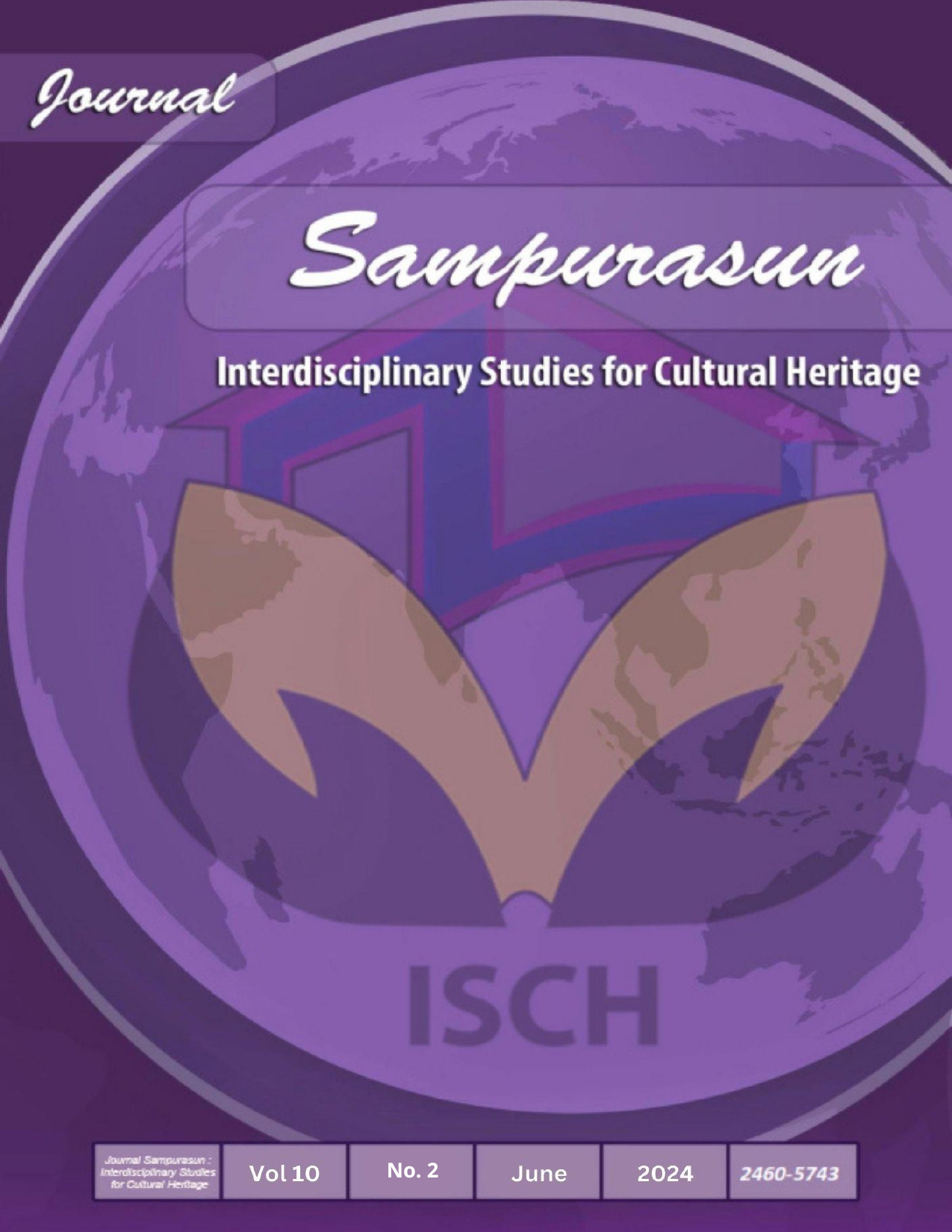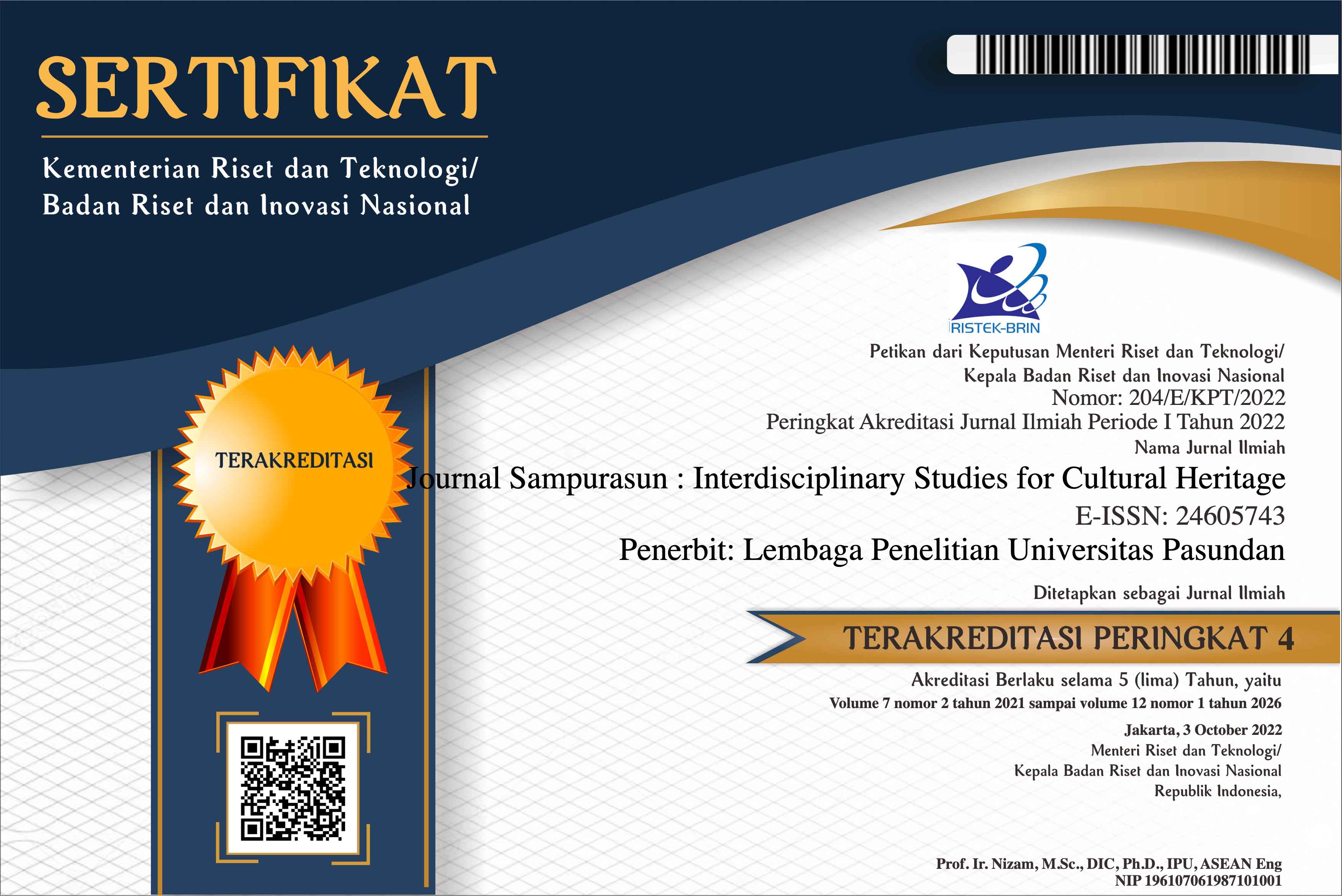ILLOCUTIONARY ACTS IN THE MOVIE MIDWAY (2019): A CULTURAL AND PRAGMATIC PERSPECTIVE
DOI:
https://doi.org/10.23969/sampurasun.v10i2.14952Keywords:
illocutionary acts, cultural and historical settings, pragmaticsAbstract
This study observes the illocutionary acts in the film "Midway" (2019) through the point of view of pragmatics and cultural context. By applying Austin’s and Leech’s speech act theory, the research identifies and categorizes various illocutionary acts and their functions performed by characters throughout the film. This research uses qualitative method in analyzing the movie. The analysis highlights how these acts contribute to the narrative and character development. In addition, the study examines the cultural and historical settings depicted in the film, considering how they influence and shape the illocutionary acts. This dual approach uncovers the interplay between language, culture, and context, providing a deeper understanding of communication dynamics in "Midway." With the types of illocutionary acts proposed by Austin, based on 8 data found, 3 data are Behabitive (37.5%), 1 data is Commissive (12.5%), 4 data are Exercitive (50%), 0 data is Verdictive (0%), and 0 data is Expositive (0%). With the functions of illocutionary acts proposed by Leech, based on 8 data found, 1 data is collaborative (12.5%), 4 data are convivial (50%), 3 data are competitive (37.5%), and 0 data is conflictive (0%). The research also brings 8 data contain practice (100%), 8 data contain perspective (100%), and 0 data contains product (0%).
Downloads
References
Book :
Austin, J. L. 1962. How to do things with words. Oxford: Oxford University Press.
Chaer, A. d. 2004. Sosiolinguistik. Jakarta: Rineka Cipta.
Leech, G. N. 1983. Principles of Pragmatics. London: Longman.
Searle, J. R. 1969. Speech acts: An essay in the philosophy of language. Cambridge: Cambridge University Press.
Yule, George. 1996. Pragmatics. New York: Oxford University Press.
Journal :
Astuti, Galih Widi dan Sofyan Sauri. 2021. Tindak Tutur Ilokusi Pada Iklan Layanan Masyarakat Pencegahan Covid-19: Filsafat Bahasa J.L. Austin. Bandung: Diglosia: Jurnal Pendidikan, Kebahasaan, dan Kesusastraan Indonesia.
Dita Sari, Novianti dkk. 2022. Tindak Tutur Ilokusi dalam Dialog Film Kisah untuk Geri Karya Monty Tiwa. Riau: Program Studi Pendidikan Bahasa dan Sastra Indonesia.
Frandika, Edo, Idawati. 2020. Tindak Tutur Ilokusi dalam Film Pendek “Tilik(2018)”. Lampung: Pendidikan Bahasa Indonesia, Fakultas Keguruan dan Ilmu Pendidikan Universitas Muhammadiyah Lampung.
Haryani, F., & Utomo, A. P. 2020. Tindak Tutur Perlokusi Dalam Dialog Film “The Teacher’s Diary” Dengan Subtitle Bahasa Indonesia. Jurnal Skripta Vol. 6 No. 2 - PBSI UPY, 16-27.
Hendar dkk. 2021. Pragmatics Analysis Of The Classification And Types Of Directive Speech Acts In Raya And The Last Dragon Movie. Bandung: Repository Widyatama.
Herman. 2017. Shift in Translation from English into Indonesia on Narrative Text. International Journal of European Studies. Vol. 1, No. 3, 2017, pp. 72-77. doi:10.11648/j.ijes.20170103.12.
Kahlke, R. M. (2014). Generic qualitative approaches: Pitfalls and benefits of methodological mixology. International journal of qualitative methods, 13(1), 37-52.
Khaterina, Megawati. 2022. Tindak Tutur Ilokusi Pada Film Cruella Karya Craig Gillespie: Kajian Pragmatik. Bandung: Repository Widyatama.
Kramsch, C. (2014). Language and culture. AILA review, 27(1), 30-55.
Lestari, A. S., & Simatupang, E. C. (2023). Deixis in Taylor Swift’s Speech at New York University Spring Graduation 2022: A Pragmatics Study. Jurnal Sinestesia, 13(1), 664-673.
Mirhosseini, S. A., & Bagheri-Lori, F. 2015. Book Review: Yin, Robert. 2011.“Doing Qualitative Research From Start to Finish”. New York: Guilford Press. Czasopisma.Uni.Lodz.Pl.
Nabila, R. R., & Nugraha, D. N. S. 2022. An Analysis of Taboo Words in Grand Theft Auto (GTA): San Andreas Opening and Mission 1 Game Script. Ethical Lingua: Journal of Language Teaching and Literature, 9(2), 592-601
Prathoomthin, S. (2009). Learners’ perceptions of culture through movies. Electronic journal of foreign language teaching, 6(1), 291-301.
Rizkia, Tiyas. 2022. Tindak Tutur Ilokusi Direktif Pada Film Raya And The Last Dragom: Kajian Pragmatik. Bandung: Repository Widyatama
Sihombing, P. S. R., Silalahi, D. E., Saragih, D. I., & Herman, H. (2021). An analysis of illocutionary act in Incredible 2 movie. Budapest International Research and Critics Institute (BIRCI-Journal): Humanities and Social Sciences, 4(2), 1772-1783.
Spencer-Oatey, H., & Franklin, P. (2012). What is culture. A compilation of quotations. GlobalPAD Core Concepts, 1(22), 1-21.
Sutiyono, A., Maximilian, A., & Ajeng, G. D. (2023). EFL Teachers’ Perceptions Regarding Cultural Awareness in ICT-Based Learning in Indonesian Elementary School Context. IJLHE: International Journal of Language, Humanities, and Education, 6(1), 40-52.
Downloads
Published
How to Cite
Issue
Section
License
Copyright (c) 2024 Journal Sampurasun : Interdisciplinary Studies for Cultural Heritage

This work is licensed under a Creative Commons Attribution 4.0 International License.
Copyright Notice
Authors should not withdraw their submitted papers because the withdrawal wastes voluntary works devoted by an associate editor and reviewers. But, we accept the withdrawal of a submitted paper if authors have unavoidable reasons. In the event that a manuscript is to be withdrawn from submission to Sampurasun Journal, a letter must be sent to the editorial office requesting withdrawal by e-mail (sampurasunjournal@unpas.ac.id) with its scanned PDF file, before the notification of acceptance for publication.
The withdraw request letter must include the following information. Paper ID, Paper title, Authors names, Reason why the paper must be withdrawn, and Date and signatures of all the authors (or signature of the contact author).
If only the contact author signs the letter, he/she must obtain the agreement of the withdrawal from all the other authors and the letter must include the description that all the other authors agreed the withdrawal. The journal will not withdraw a manuscript from peer review until such a letter has been received. Authors must not assume their manuscript has been withdrawn until they have received appropriate notification from the editorial office. Withdrawal of a manuscript subsequent to acceptance for publication will only be granted in the most exceptional of circumstances.
After the paper is accepted for publication, the withdrawal is not permitted in principle. The authors must always pay the charge even if the withdrawal is permitted. Any request of withdrawal that does not follow the above procedure is treated as invalid. If illegal submission, e.g., plagiarized or duplicate submission, is found for a paper, the withdrawal of the paper will never be permitted and the authors will be punished based on the rule. It is not acceptable practice to withdraw a manuscript in the event of acceptance at another journal. This constitutes dual submission. The editorial office of the other journal will be notified of your actions. In such circumstances Sampurasun ISCH may chose to impose appropriate punitive action subject.
Withdrawal Penalty
Author is not allowed to withdraw submitted manuscripts, because the withdrawal is waste of valuable resources that editors and referees spent a great deal of time processing submitted manuscript, money and works invested by the publisher. If author still requests withdrawal of his/her manuscript when the manuscript is still in the peer-reviewing process, author will be punished with paying $200 per manuscript, as withdrawal penalty to the publisher. However, it is unethical to withdraw a submitted manuscript from one journal if accepted by another journal. The withdrawal of manuscript after the manuscript is accepted for publication, author will be punished by paying US$500 per manuscript. Withdrawal of manuscript is only allowed after withdrawal penalty has been fully paid to the Publisher. If author don't agree to pay the penalty, the author and his/her affiliation will be blacklisted for publication in this journal. Even, his/her previously published articles will be removed from our online system.


















